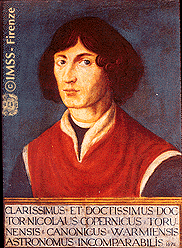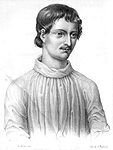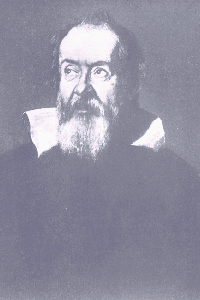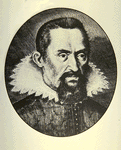The Church's Three Denials:(Work in Progress) Chapter One

Chapter One
More than anyone else Nicolaus Copernicus initiated the division between the ancient medieval universe and that of the modern era.This was the Copernican revolution.
Nicolaus Copernicus was born at Torun in Poland on 19 February 1473. How can we appreciate the genius of Copernicus? From the time of Ptolemy (AD90-AD168)all accepted that the earth was the centre of the Universe and it was left to this genius of a man to change our understanding. His education encompassed amongst others medicine and Canon Law in which he obtained his doctorate at Ferrara.
He sought a solution to the age old problem of the planets, a chaotic system which was inherited from Ptolomy and Aristotle. He wanted an elegant mathematical solution or formula. He thought the Ptolomic strategy was a monster which could not be modified.Any modification would be untenable.The universe would have to make sense. He was asked by the papacy to advise on the problem.
Like earlier Greek astronomer / philosopher Pythagoras he embraced the conviction that nature was ultimately comprehensible in simple harmonious mathematical terms.This theme runs through all science, but also of a transcendental eternal quality. A divine creator would not have created a haphazard, slipshod universe or heavens. His work was every where good and orderly Note the words simple and elegant. The solution to most science problems are simple and elegant.
On reviewing all Greek literature he found that several had already proposed a moving earth.In 1512 Copernicus began his cycle of observations of the planets with Mars. In 1514 he theorized a heliocentric universe using mathematical calculations, and circulated it among his friends. From early in his life, he performed astronomical observations and calculations,when ever he had the time but never in a professional capacity.Astrology would have been part of his study in medicine.
Twenty years later he gave a lecture in Rome in the presence of the Pope and made a request to publish. He was very reluctant but his friends prevailed upon him and legend has it,that on the last day of his life he received his copy entitled De Revelutionibus. For several decades the revolution was not appreciated, but a few astronomers began to find Copernicus's argument persuasive and the opposition began to mount. When it was published by the Protestant Oseander in Leipzig on his own initiative he wrote in the preface, words that meant "Its only a theory". Unwittingly this possibly saved the book.
The first opposition came not from the Catholic Church as one would expect, but from the Protestants.The Catholics allowed considerable latitude at this time.The Protestants claimed that it allowed the pristine literal truth of the Bible to be contaminated. Luther called Copernicus an "upstart astronomer, This fool wants to turn the entire science of astronomy upside down! But, as the Bible tells us, Joshua told the Sun, not the Earth, to stop in its path!" and was soon joined by others like Calvin who recommended stringent measures to suppress the heresy. The Bible said "The world also is established that it cannot be moved" The reformer, Phillip Melanchton, a close associate of Luther voices his opinion of Copernicus:'Some believe that to expound such an absurd matter, as that Sarmatian [Polish] astronomer has done, who would move the Earth and stop the Sun, is an excellent thing. Verily, wise governors should curb such talented rashness'.
The Catholics felt bound to react to the Protestants. They could not allow them to occupy the 'moral' high ground, and took a definite stand against Copernicumism.In March 1616 the Roman Catholic Church's Congregation of the Index issued a decree suspending De revolutionibus until it could be "corrected," on the grounds that the supposedly Pythagorean doctrine, that the Earth moves and the Sun doesn't, was "false and altogether opposed to Holy Scripture." The same decree also prohibited any work that defended the mobility of the Earth or the immobility of the Sun, or that attempted to reconcile these assertions with Scripture. Between the year 1582 and 1592 there was hardly a teacher in Europe who was persistently, openly and actively spreading the news about the "universe which Copernicus had charted", more than Giordano Bruno.
 For his efforts he was burnt at the stake. Bruno proposed an advanced version of the heliocentric theory. He had written of an infinite universe which had left no room for that greater infinite conception which is called God. He could not conceive that God and nature could be separate and distinct entities as taught by Genesis,
For his efforts he was burnt at the stake. Bruno proposed an advanced version of the heliocentric theory. He had written of an infinite universe which had left no room for that greater infinite conception which is called God. He could not conceive that God and nature could be separate and distinct entities as taught by Genesis,the Church and even taught by Aristotle. He incidentally also preached a philosophy which made the mysteries of the virginity of Mary, of the crucifixion and the mass, meaningless. (From the Galileo Project) 'It is often maintained that Bruno was executed because of his Copernicanism and his belief in the infinity of inhabited worlds. In fact, we do not know the exact grounds on which he was declared a heretic because his file is missing from the records. Scientists such as Galileo and Johannes Kepler were not sympathetic to Bruno in their writings.'
Into this climate emerged Galileo who was quick to distance himself from Bruno. He was very careful and prudent enough to steer clear of any connection with Bruno. He didn't want any quilt by association.Galileo never met Bruno in person and makes no mention of him in his works, although he must have read some of them. We may not blame Galileo for being diplomat enough to withhold mention of a recognized heretic.

Galileo wanted to break with Aristotelian science which had lately been embraced by the Catholic and Protestant Churches. Not only the movement of the planets but other parts of his science. To argue and question within Aristotelian orbit was quite acceptable but to say that what was written was untrue was heretical so he had to move beyond and outside the churches teachings to promote Copernican theory and not Aristotleism and was therefore heretical. Kepler and Newton were more fortunate in that they were not so much under the influence of the Church. Galileo's influence outside Italy was considerable and opened the way for others to follow. Aristotle had kept science shackled and Galileo had broken those shackles. Galileo has often been criticized because he played for personal safety in the matter of his own difficulties. It was said 'we demand a great deal of our heroes'. Trying to understand science and make progress in an Aristotelian way was impossible but once Copernicus was accepted men were freed to progress.He did not escape the wrath of the Pope. The Heliocentric theory was a fundamental threat to the entire Christian framework of cosmology,theology and morality viz heaven, hell and purgatory, and God's throne.If the earth moved it could no longer be the fixed centre of God's creation and his plan of salvation,nor could man be the centre focus of the cosmos.So Galileo was forced to recant an placed under house arrest.
The Church's Condemnation of Galileo
The text of the condemnation reads: "We say, pronounce, sentence and declare that you, Galileo, by reason of these things which have been detailed in the trial and which you have confessed already, have rendered yourself according to this Holy
Office vehemently suspect of heresy, namely of having held and believed a doctrine that is false and contrary to the divine and Holy Scripture: namely that Sun is the centre of the world and does not move from east to west, and that one may hold and defend as probable an opinion after it has been declared and defined contrary to Holy Scripture. Consequently, you have incurred all the censures and penalties enjoined and promulgated by the sacred Canons and all particular and general laws against such delinquents. We are willing to absolve you from them provided that first, with a sincere heart and unfeigned faith, in our presence you abjure, curse and detest the said errors and heresies, and every other error and heresy contrary to the Catholic and Apostolic Church in the manner and form we will prescribe to you. Furthermore, so that this grievous and pernicious error and transgression of yours may not go altogether unpunished, and so that you will be more cautious in future, and an example for others to abstain from delinquencies of this sort, we order that the book Dialogue of Galileo Galilei be prohibited by public edict. We condemn you to formal imprisonment in this Holy Office at our pleasure. As a salutary penance we impose on you to recite the seven penitential psalms once a week for the next three years. And we reserve to ourselves the power of moderating, commuting, or taking off, the whole or part of the said penalties and penances. This we say, pronounce, sentence, declare, order and reserve by this or any other better manner or form that we reasonable can or shall think of. So we the undersigned Cardinals pronounce:
F. Cardinal of Ascoli
B. Cardinal Gessi
G. Cardinal Bentivoglio
F. Cardinal Verospi
Fr. D. Cardinal of Cremona
M. Cardinal Ginetti
Fr. Ant. s Cardinal of. S. Onofrio".
 Johannes Kepler (1571-1630). In 1584 he entered the Protestant seminary at Adelberg, and in 1589 he began his university education at the Protestant university of Tübingen. Here he studied theology and read widely. He passed the M.A. examination in 1591 and continued his studies as a graduate student.Kepler's teacher in the mathematical subjects was Michael Maestlin (1550-1635). Maestlin was one of the earliest astronomers to subscribe to Copernicus's heliocentric theory, although in his university lectures he taught only the Ptolemaic system. Only in what we might call graduate seminars did he acquaint his students, with the technical details of the Copernican system. Kepler stated later that at this time he became a Copernican for "physical or, if you prefer, metaphysical reasons.".
Johannes Kepler (1571-1630). In 1584 he entered the Protestant seminary at Adelberg, and in 1589 he began his university education at the Protestant university of Tübingen. Here he studied theology and read widely. He passed the M.A. examination in 1591 and continued his studies as a graduate student.Kepler's teacher in the mathematical subjects was Michael Maestlin (1550-1635). Maestlin was one of the earliest astronomers to subscribe to Copernicus's heliocentric theory, although in his university lectures he taught only the Ptolemaic system. Only in what we might call graduate seminars did he acquaint his students, with the technical details of the Copernican system. Kepler stated later that at this time he became a Copernican for "physical or, if you prefer, metaphysical reasons.".Kepler was invited by Tycho Brahe to Prague to become his assistant and calculate new orbits for the planets from Tycho's observations In 1609 his Astronomia Nova ("New Astronomy") appeared, which contained his first two laws (planets move in elliptical orbits with the sun as one of the foci, and a planet sweeps out equal areas in equal times). Whereas other astronomers still followed the ancient precept that the study of the planets is a problem only in kinematics, Kepler took an openly dynamic approach, introducing physics into the heavens. 1618 marked the beginning of the Thirty Years War, a war that devastated the German and Austrian region. Kepler's position in Linz where he now resided, became progressively worse, as Counter Reformation measures put pressure on Protestants in the Upper Austria province of which Linz was the capital .During this time Kepler was having his Tabulae Rudolphinae ("Rudolphine Tables") printed, the new tables, based on Tycho Brahe's accurate observations, calculated according to Kepler's elliptical astronomy. (The Galileo Project)
Kepler of course was not persecuted as was Galileo and using the enormous amount of data from the observations of Tycho calculated the elliptical course of the planets.
This I have called the Church's first denial and it was not until the eighteen hundreds that it withdrew it objections. There was of course no threat to the position of God, if anything it brought order to chaos.Most now accept that the earth is no longer the centre of the Universe but from where we stand on this solid earth it does not appear so.
It is possible that the church could have reacted differently to this triumph. than it did. Seldom in its history had the Christian Religion attempted to suppress so rigidly scientific theory on the basis of scriptural contradiction. For the present most European intellectuals would remain devoutly Christian.(Tarnas)
Today we cannot say that the Copernican theory is 'right' and the Ptolemaic theory 'wrong' in any meaningful physical sense. The two theories when improved by adding terms involving the square and higher powers of the eccentricities of the planetary orbits, are physically equivalent to one another. What we can say, however, is that we would hardly have come to recognize that this is so if scientists over four centuries or more had not elected to follow the Copernican point of view. The Ptolemaic system would have proved sterile because it would have been too hard to make progress that way.(Hoyle)
References
1.Richard Tarnas The Passion of the Western Mind.
2. Fred Hoyle. Nicolas Copernicus, an Essay on his Life and Work 1973.
3.Nicolaus Copernicus from Wikipedia, the free encyclopedia.
4.The Galileo Project

0 Comments:
Post a Comment
Subscribe to Post Comments [Atom]
<< Home